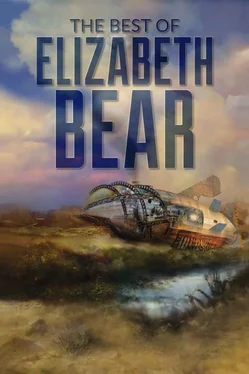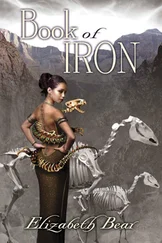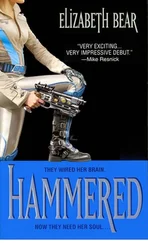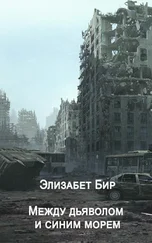She heard it, then, the wreath of music that hung on him, thin and thready though it was in the absence of his Chord. That was well. “It is I.”
“Do all—all your people—does that always happen?”
“I have no people,” he said. “But yes. Even in death we sing. It is why the Chord must be kept together.”
“So when you said it’s only you…”
“I am the last,” said Orm the Beautiful.
She looked down, and he gave her time to think.
“It would be very expensive,” she said, cautiously, rubbing the fingertips together as if they’d lost sensation. “We would have to move quickly, if poachers have already found your… mother-cave. And you’re talking about a huge engineering problem, to move them without taking them apart. I don’t know where the money would come from.”
“If the expense were not at issue, would the museum accept the bequest?”
“Without a question.” She touched his eye-ridge again, quickly, furtively. “Dragons,” she said, and shook her head and breathed a laugh. “Dragons.”
“Money is no object,” he said. “Does your institution employ a solicitor?”
The documentwas two days in drafting. Orm the Beautiful spent the time fretting and fussed, though he kept his aspect as nearly serene as possible. Katherine—the curator—did not leave his side. Indeed, she brought him within the building—the tall doors and vast lobby could have accommodated a far larger dragon—and had a cot fetched so she could remain near. He could not stay in the lobby itself, because it was a point of man-pride that the museum was open every day, and free to all comers. But they cleared a small exhibit hall, and he stayed there in fair comfort, although silent and alone.
Outside, reporters and soldiers made camp, but within the halls of the Museum of Natural History, it was bright and still, except for the lonely shadow of Orm the Beautiful’s song.
Already, he mourned his Chord. But if his sacrifice meant their salvation, it was a very small thing to give.
When the contracts were written, when the papers were signed, Katherine sat down on the edge of her cot and said, “The personal bequest,” she began. “The one the Museum is meant to sell, to fund the retrieval of your Chord.”
“Yes,” Orm the Beautiful said.
“May I know what it is now, and where we may find it?”
“It is here before you,” said Orm the Beautiful, and tore his heart from his breast with his claws.
He fell with a crash like a breaking bell, an avalanche of skim-milk-white opal threaded with azure and absinthe and vermilion flash. Chunks rolled against Katherine’s legs, bruised her feet and ankles, broke some of her toes in her clicking shoes.
She was too stunned to feel pain. Through his solitary singing, Orm the Beautiful heard her refrain: “Oh, no, oh, no, oh, no.”
Those whocame to investigate the crash found Katherine Samson on her knees, hands raking the rubble. Salt water streaked opal powder white as bone dust down her cheeks. She kissed the broken rocks, and the blood on her fingertips was no brighter than the shocked veins of carnelian flash that shot through them.
Orm the Beautiful was broken up and sold, as he had arranged. The paperwork was quite unforgiving; dragons, it seems, may serve as their own attorneys with great dexterity.
The stones went for outrageous prices. When you wore them on your skin, you could hear the dragonsong. Institutions and the insanely wealthy fought over the relics. No price could ever be too high.
Katherine Samson was bequeathed a few chips for her own. She had them polished and drilled and threaded on a chain she wore about her throat, where her blood could warm them as they pressed upon her pulse. The mother-cave was located with the aid of Orm the Beautiful’s maps and directions. Poachers were in the process of excavating it when the team from the Smithsonian arrived.
But the Museum had brought the National Guard. And the poachers were dealt with, though perhaps not with such finality as Orm the Beautiful might have wished.
Each and each, his Chord were brought back to the Museum.
Katherine, stumping on her walking cast, spent long hours in the exhibit hall. She hovered and guarded and warded, and stroked and petted and adjusted Orm the Beautiful’s hoard like a nesting falcon turning her eggs. His song sustained her, his warm bones worn against her skin, his voice half-heard in her ear.
He was broken and scattered. He was not a part of his Chord. He was lost to them, as other dragons had been lost before, and as those others his song would eventually fail, and flicker, and go unremembered.
After a few months, she stopped weeping.
She also stopped eating, sleeping, dreaming.
Going home.
They cameas stragglers, footsore and rain-draggled, noses peeled by the sun. They came alone, in party dresses, in business suits, in outrageously costly T-shirts and jeans. They came draped in opals and platinum, opals and gold. They came with the song of Orm the Beautiful warm against their skin.
They came to see the dragons, to hear their threaded music. When the Museum closed at night, they waited patiently by the steps until morning. They did not freeze. They did not starve.
Eventually, through the sheer wearing force of attrition, the passage of decades, the Museum accepted them. And there they worked, and lived, for all time.
And Ormthe Beautiful?
He had been shattered. He died alone.
The Chord could not reclaim him. He was lost in the mortal warders, the warders who had been men.
But as he sang in their ears, so they recalled him, like a seashell remembers the sea.

Erase, Erase, Erase
I shouldn’t have letit get so far. It seemed so inconsequential at first. Almost a relief to find yourself getting a little misty around the edges. Bits dropping off. Stuff you don’t need anymore.
Erase, erase, erase.
Sorry, historians. I know some of this stuff would be useful to you, but it’s all gone now. All gone.
I burned most of it.
Only I am still here.
And I am falling apart, and I can’t remember who I used to be or how I got here.
Irresponsible of me, I know.
It’s notjust the memories, either. There’s bits of me gone that I swear were there before. Fingertips. Some hair. The eyelashes on my right eye.
I’m almost certain I used to have those.
Sometimes I reach for something—coffee mug, keyboard—and realize I can’t seem to find my own hand. I have to go look around the house for it, because I never remember where I had it last. Feet, at least, limbs—I don’t tend to get far when those have gone missing. It’s hard not to notice as soon as you try to stand up.
But I’ve found hands in the bed, under the bed, halfway up the stairs. Once in the fridge, which worried me a lot but actually it went right back on. Just felt a little weird and numb for a few minutes. Found my ear still stuck on an earbud once, and that was pretty awful. When the nose comes off the glasses usually go with it.
Читать дальше














